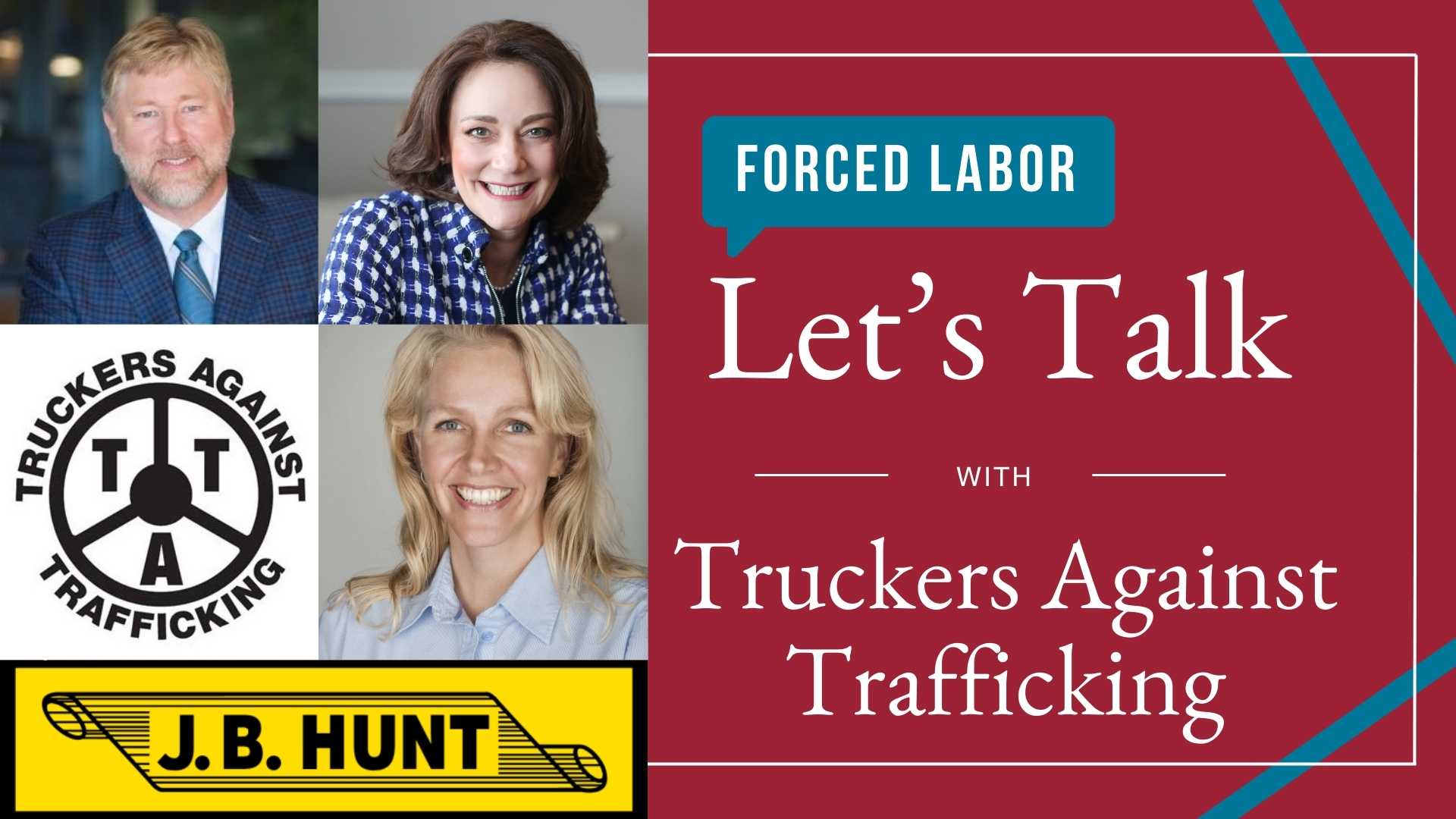

Our final event for the 2021 Let’s Talk about Forced Labor program was a huge success, with more than 900 people registering to attend. University of Arkansas students and employees of J.B. Hunt Transport Services, Inc., gathered in-person and virtually for the “Preventing Human Trafficking” workshop hosted by the Business Integrity Leadership Initiative and sponsored by J.B. Hunt.
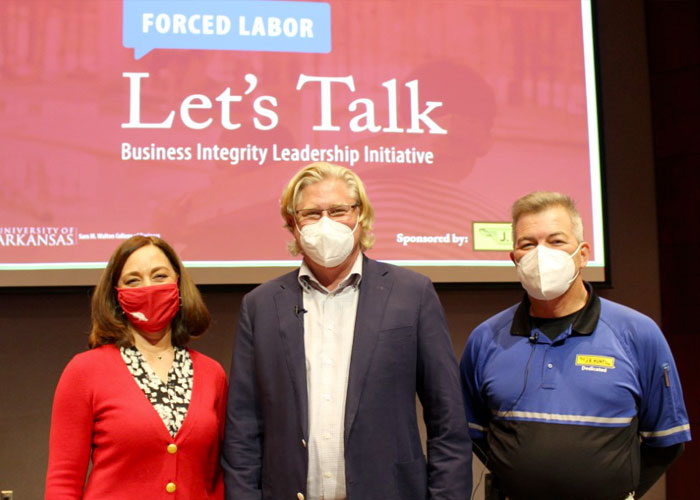
Everyone who participated learned a great deal about human trafficking, the toll it takes on its victims and how the transportation industry is working to address this issue.
Kendis Paris, executive director and co-founder of the nonprofit Truckers Against Trafficking, explained how her organization’s “targeted systems change approach” tackles the harmful mindsets and norms that allow human trafficking to continue. For example, many women who solicit at truck stops are not willing participants in the sex trade, but victims. Truckers Against Trafficking educates drivers on the harm that negative terms like “lot lizards” do to these victims.
“Who wants to help a lizard? Who has compassion for a lizard? Who wants to know the backstory of a lizard?” Paris said. By changing the terminology around this practice, drivers can also change their thought processes and offer help instead of judgement.
By working within pre-existing transportation and law enforcement systems for positive change, Truckers Against Trafficking “is building the largest mobile army of transportation professionals dedicated to discovering and disrupting human trafficking networks,” according to Paris.
We were grateful to hear Liz Williamson, training specialist for Truckers Against Trafficking, speak on her experiences as a human trafficking victim between the ages of 6 and 23. She was sold for the first time on her 6th birthday. During school break trips with her mother and a family friend, Williamson was trafficked across many different states, including Arkansas. The men who took advantage of her were often authority figures such as lawyers, police officers and doctors.
The trauma took a heavy toll on young Williamson. By age 8, she wanted to disappear. “I thought it was the biggest joke in the world that I was alive.”
Williamson shared some of the warning signs victims of commercial sex trafficking may display, including injuries with inconsistent explanations, being afraid to speak without permission and malnutrition. In addition to intervening when something doesn’t seem right, Williamson urged the audience to “choose the perspective of hope” and extend kindness to those around them.
“It’s true, it happened to me.” Williamson said. “But it could end with me.”
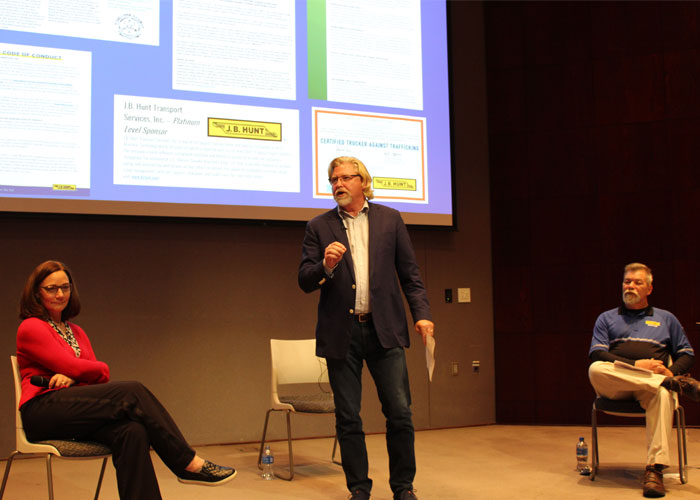
Greer Woodruff, senior vice president of corporate safety, security and driver personnel for J.B. Hunt, shared how J.B. Hunt is working to help victims like Williamson become survivors. One of J.B. Hunt’s strategies is to educate truck drivers on utilizing the observation skills they already use on the job to spot and report human trafficking. Woodruff was proud to say that over 102,000 employees have been educated in human trafficking prevention.
As a leader in the transportation industry, J.B. Hunt is using its influence and visibility to educate others, including their partners in local, state and federal agencies. J.B. Hunt has also requested its suppliers to commit to the pledge against human trafficking and over 70% of its supplier spend has agreed.
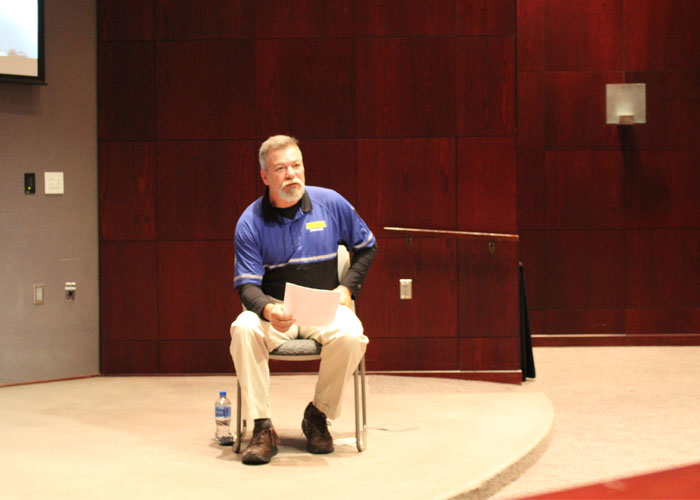
We also heard from John Kimzey, a driver for J.B. Hunt and a real-life trucker against trafficking. He shared the misconceptions he had about transportation workers before becoming one himself, including the belief that drivers are sometimes connected to illegal activity.
After witnessing evidence of trafficking in the rural areas on his route, Kimzey conducted his own research and came across resources from Truckers Against Trafficking. He even brought up the nonprofit during his orientation at J.B. Hunt.
Speaking to the harmful mindsets that Trucking Against Trafficking works to address, he said, “people define themselves by what they are called” and encouraged the audience to “offer hope instead of a label” when encountering possible trafficking victims.
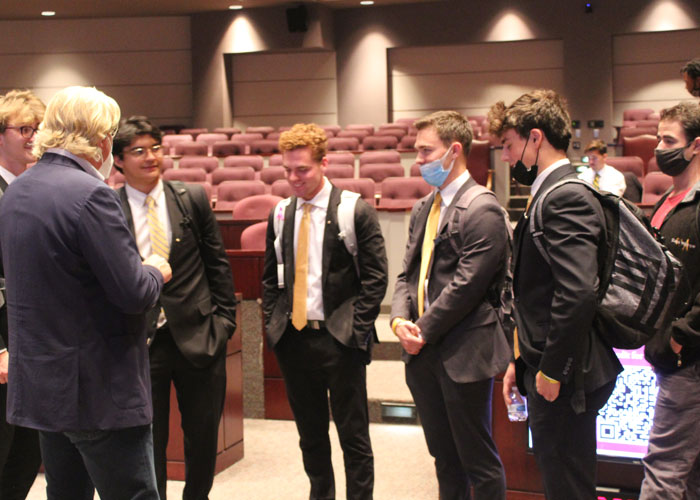
After the speakers had finished, audience members asked questions and gained additional information on how to make a difference, including how to use the free Truckers Against Trafficking app to report evidence of human trafficking. As the room cleared out, several students stayed after to meet Woodruff and Kimzey and discuss the topic further.
Thank you to J.B. Hunt, Truckers Against Trafficking, and everyone else who made this event— and mindset shift—possible. You can read more about the workshop on Talk Business & Politics.






